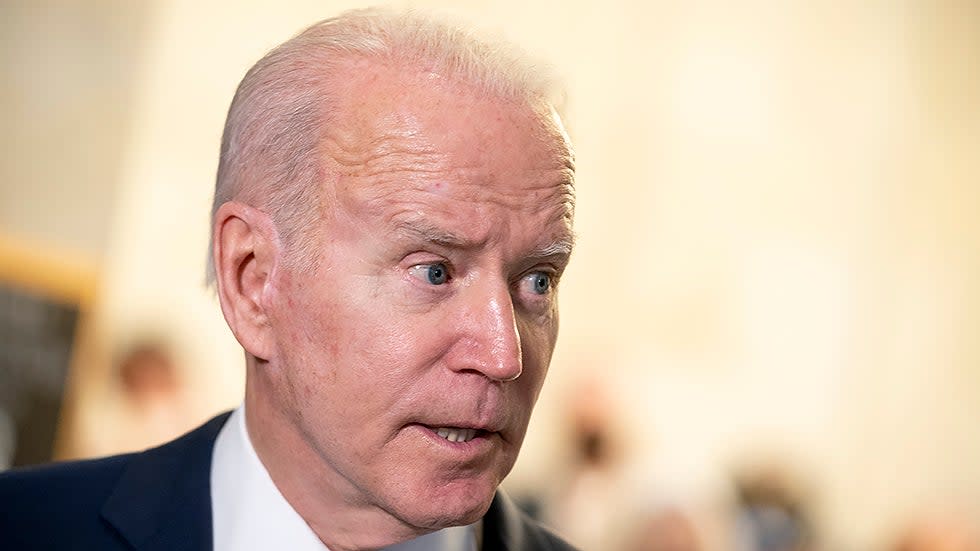The Memo: Supreme Court, Sinema deliver twin blows to Biden

- Oops!Something went wrong.Please try again later.
- Oops!Something went wrong.Please try again later.
President Biden, embattled on several fronts, got hit by a twin blow Thursday, as the Supreme Court struck down a key vaccine mandate and his quest to pass legislation protecting voting rights looked close to defeat.
The Supreme Court ruled against the biggest of the administration's mandates, which would have required medium-sized and large employers to require their workers to get vaccinated or take regular COVID tests.
Biden had argued that the move, which would have affected about 84 million workers, would have been an effective tool to help finally curb the pandemic.
The voting rights push, always an uphill climb, appeared to be dealt a death blow when Sen. Kyrsten Sinema (D-Ariz.) restated her opposition to reforming the filibuster. Sinema added a pinch of drama to the announcement by delivering it in a Senate floor speech right before Biden was due to make his case to Democrats on Capitol Hill.
Together, the two setbacks create yet more trouble for a president who has had his standing sapped by inflation, which hit a 40-year high in December; by the exponential rise in COVID cases driven by the omicron variant; and by the fading chances of passing the Build Back Better bill that he had hoped would cap his legislative achievements.
The White House sought to play a bad hand as best it could on Thursday, with press secretary Jen Psaki highlighting other achievements.
She pointed to the huge number of people - around 200 million - vaccinated since Biden took office, strong employment growth totaling around six million new jobs, and a foreign policy Psaki characterized as having "rebuilt our alliances."
The press secretary sounded a more mordant note, however, in outlining the difficulties that Biden faces, given the thinness of Democrats' congressional majorities.
Psaki said that the administration was focused on achieving big things rather than winning votes on "bunny rabbits and ice cream."
Insisting that the administration would keep trying to "push the boulder up the hill," she acknowledged "we also recognize when you have a small margin and threshold in the Senate, it's very hard to get things done."
The tone of her remarks was notable, exemplifying a White House that has increasingly focused on what has already been done rather than promising more to come.
That may be pragmatic, but it is also a striking posture from an administration that is not yet a year old. Some dissenting Democratic voices, particularly on the left of the party, are lamenting that Biden has not been able to accomplish more - and that his failure to do so will hurt the party in November's midterm elections.
Biden is in a particularly tough spot on the voting rights push - an effort that he had cast in historic terms during a speech in Atlanta on Tuesday. In that address, the president drew parallels between the current fight and huge past battles such as the Civil War and the effort to end segregation in the 1950s and 1960s.
Speaking to reporters at the Capitol Thursday, a frustrated Biden appeared to admit defeat - for now.
Initially saying, "I hope we can get this done but I'm not sure," the president almost immediately added: "Like every other major civil rights bill that came along, if we miss the first time, we can come back and try it a second time. We missed this time. We missed this time."
Late Thursday afternoon, it was reported that Manchin and Sinema were headed to the White House for talks, suggesting all was not perhaps lost.
But it would require an extraordinary turnaround to breathe new life into the voting rights effort, given unanimous Republican opposition and seemingly definitive statements from the holdout Democratic duo.
In her floor speech, Sinema said she supported the voting rights legislation but could not support "separate actions that worsen the underlying disease of division infecting our country."
In a statement, Manchin reiterated without caveats that he would "not vote to eliminate or weaken the filibuster."
As for the Supreme Court, Republicans took delight in what they portrayed as a rebuke to executive overreach.
Sen. Mike Braun (R-Ind.) said that the court had delivered "a win for the liberties and livelihoods of millions of Americans." Former President Trump weighed in too, gloating that the justices had confirmed "what we all knew: Biden's disastrous mandates are unconstitutional."
Liberals were cast into deeper gloom not only by the ruling itself but by its fresh reminder of the high court's dominant conservative majority. With six conservative justices, including three Trump nominees, on the nine-member Supreme Court bench, liberals fear other defeats on fundamental issues, notably abortion rights.
Could things turn around for Biden and his party? Of course.
There are some signs that the omicron surge may have peaked in the northeastern cities that were first and worst afflicted by its rise. If the pandemic recedes, there may be all kinds of beneficial political effects for the president, including a loosening up of supply chain clogs, greater stability in daily life, and improved morale among voters.
But the kind of outcome is neither certain nor immediately imminent.
Meanwhile, the gradient that Biden is battling against just keeps getting steeper.
The Memo is a reported column by Niall Stanage.

